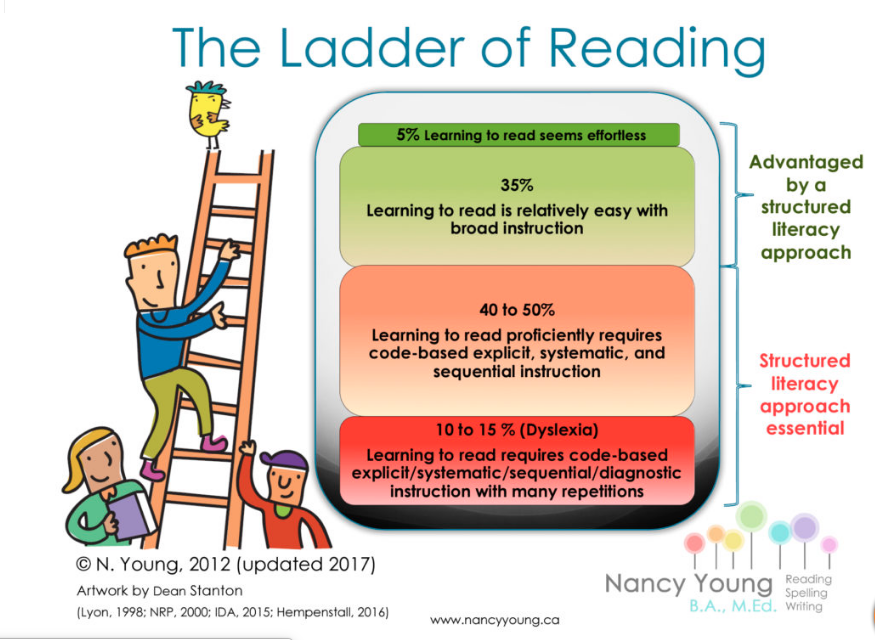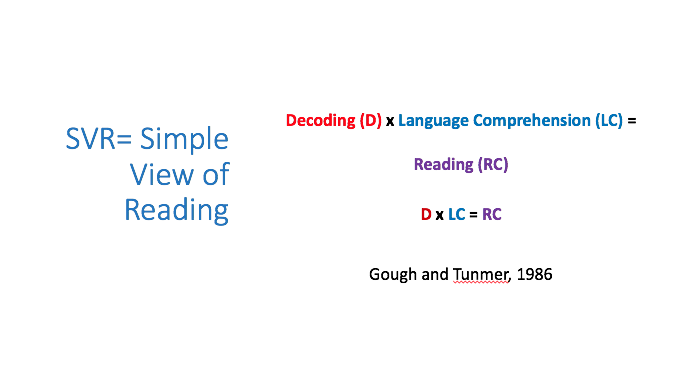Thread: There was a session today at #NCTE19, the annual conference of @ncte, called "Misreading the Science of Reading." I want to share some thoughts, and some reading material, to add to the conversation. #elachat #ilachat 1/x
I& #39;ve been an education reporter for a decade+. A few yrs ago, I knew nothing abt the "science of reading." But in the past 3 yrs, I& #39;ve read thousands of pages of books, articles, research papers. 2/x #NCTE19
I& #39;ve interviewed hundreds of researchers, teachers, school leaders, tutors, parents, students and struggling readers. I& #39;ve visited 9 states. And I& #39;ve been shocked to learn that: 3/x #NCTE19
a) there& #39;s a gigantic body of scientific evidence that& #39;s accumulated over the past several decades abt how skilled reading works, what kids need to learn to become skilled readers, and what& #39;s going on when kids struggle; and... 4/x #NCTE19
b) that lots of teachers don& #39;t know abt this scientific evidence. Many school leaders, teacher educators, curriculum developers, parents, and policymakers don& #39;t know about this evidence either. Also, lots of journalists don& #39;t know abt it, including me a few yrs ago. 5/x #NCTE19
But, to repeat a phrase I hear often and that applies to me, too: "When we know better, we do better." I& #39;ve been amazed by what I& #39;ve learned. The science is fascinating and important - and often mischaracterized and misunderstood. So... 6/x #NCTE19
... in this thread, I& #39;m going to share some key readings about the research. If you& #39;re curious about the science of reading, these are some good places to start to understand what it& #39;s all about. #NCTE19 7/x
This is a quick read and a good overview of some basics about how reading works. "No one is born with the connections between vision and speech, the connections that enable reading." http://go.info.amplify.com/hubfs/CFER/Primer/PrimerPt1_LearningToRead.pdf">https://go.info.amplify.com/hubfs/CFE... 8/x #NCTE19
This is part 2 of that @Amplify primer. It goes into all kinds of fascinating stuff abt reading comprehension, which everyone agrees is the goal of reading- and the goal of reading instruction. https://go.info.amplify.com/hubfs/Primer%20II/Primer2_2018_Final.pdf">https://go.info.amplify.com/hubfs/Pri... 9/x #NCTE19
This piece is a heavier lift in terms of time, but worth every minute IMO. It& #39;s a recent overview (w/ tons of references) of the research on reading acquisition by @annecastles @Kathy_Rastle @ReadOxford https://journals.sagepub.com/doi/pdf/10.1177/1529100618772271">https://journals.sagepub.com/doi/pdf/1... 10/x #NCTE19
Many disagreements abt reading are rooted in fights about phonics and the role of phonology in learning to read. This is a good piece on the importance of phonics, and how to improve phonics instruction. https://journals.sagepub.com/doi/pdf/10.1177/1529100618772272">https://journals.sagepub.com/doi/pdf/1... 11/x #NCTE19
The @ILAToday came out in favor of explicit, systematic phonics instruction in this brief this summer: https://www.literacyworldwide.org/docs/default-source/where-we-stand/ila-meeting-challenges-early-literacy-phonics-instruction.pdf">https://www.literacyworldwide.org/docs/defa... 12/x #NCTE19
From @ILAToday: "Learning to read can, at times, seem almost magical. A child sits in front of a book and transforms those squiggles and lines into sounds, puts those sounds together to make words, and puts those words together to make meaning. But it’s not magical." 13/x #NCTE19
"English is an alphabetic language. We have 26 letters. These letters, in various combinations, represent the 44 sounds in our language. Teaching students the basic letter–sound combinations gives them access to sounding out approximately 84% of the words in English print." 14/x
"Of course, equal amounts of time need to be spent on teaching the meanings of these words, but the learning of these basic phonics skills is essential to becoming a fluent reader." https://www.literacyworldwide.org/docs/default-source/where-we-stand/ila-meeting-challenges-early-literacy-phonics-instruction.pdf">https://www.literacyworldwide.org/docs/defa... 15/x #NCTE19
Some kids will learn to read without much explicit instruction. But many kids will not. https://dyslexiaida.org/ladder-of-reading-infographic-structured-literacy-helps-all-students/">https://dyslexiaida.org/ladder-of... 16/x #NCTE19
Some kids desperately need explicit and systematic instruction in how their written language works and all kids benefit from it. It& #39;s an equity issue. This is a helpful article. https://www.teachermagazine.com.au/articles/learning-to-read-and-explicit-teaching">https://www.teachermagazine.com.au/articles/... It says: 17/x #NCTE19
"When children begin school, we cannot predict with sufficient accuracy which children will struggle to learn to read without explicit, systematic phonics instruction and which will not. Therefore...." https://www.teachermagazine.com.au/articles/learning-to-read-and-explicit-teaching">https://www.teachermagazine.com.au/articles/... 18/x #NCTE19
"... the most ethical and prudent action is to provide all children with the most effective teaching methods, based on the best available evidence, thereby accelerating the progress of all children and minimising the likelihood that any child will struggle to learn to read." 19/x
For me, one of the most profound and useful things to learn about was the "Simple View of Reading" (SVR). It was proposed in 1986 by two reading researchers to clarify the role of decoding in reading comprehension. It doesn& #39;t say that reading is "simple." 20/x #NCTE19
The SVR is a model that& #39;s been validated by decades of complex scientific research. Some good explainers: https://understandingreading.home.blog/2019/11/11/the-simple-view-of-reading/">https://understandingreading.home.blog/2019/11/1... https://www.cdl.org/articles/the-simple-view-of-reading/">https://www.cdl.org/articles/... https://righttoreadproject.com/2019/05/30/part-1-simple-view-of-reading/">https://righttoreadproject.com/2019/05/3... 21/x #NCTE19
Just this week, there was this #ELAchat aby SVR
https://twitter.com/elachat_US/status/1197595139218329600">https://twitter.com/elachat_U... Many educators admitting they didn& #39;t know about the Simple View, or had only recently learned of it. Lots of others weighing in w/ expertise about how it& #39;s useful in their teaching. 22/x #NCTE19
https://twitter.com/elachat_US/status/1197595139218329600">https://twitter.com/elachat_U... Many educators admitting they didn& #39;t know about the Simple View, or had only recently learned of it. Lots of others weighing in w/ expertise about how it& #39;s useful in their teaching. 22/x #NCTE19
More of these #ELAchat coming. https://eduvaites.org/elachat/ ">https://eduvaites.org/elachat/&... After Thanksgiving, it& #39;s "The Fuss About Teacher Prep: Why are teachers saying they were unprepared to teach reading?" hosted by @TrailblzingAbby & @ScottGeisler12 23/x #NCTE19
Many educators don& #39;t know this science cause they weren& #39;t taught it in prep programs or on the job. Listen to these classroom teachers, admins, and professors talk about how they learned about the science of reading. https://www.youtube.com/channel/UCm9TD9u7xGdRUaGjHkOthxw">https://www.youtube.com/channel/U... 24/x #NCTE19
In my reporting, I& #39;ve found that educators are actually being led astray - by prep, PD and curriculum materials - about how skilled reading works. This is really unfair to teachers - and bad for kids. https://www.apmreports.org/story/2019/08/22/whats-wrong-how-schools-teach-reading">https://www.apmreports.org/story/201... 25/x #NCTE19
There& #39;s A LOT of confusion about the role of cueing and context in word reading. It& #39;s really important to understand the nuances. I learned a lot from David Kilpatrick. I recommend his book: https://www.wiley.com/en-us/Essentials+of+Assessing%2C+Preventing%2C+and+Overcoming+Reading+Difficulties+-p-9781118845240">https://www.wiley.com/en-us/Ess... 26/x #NCTE19
Here are a couple of articles that explain the science around the cueing/ context stuff in clear language (w/ lots of citations): https://lizditz.typepad.com/files/din_02_02_10.pdf">https://lizditz.typepad.com/files/din... http://www.foundationstutoring.org/wp-content/uploads/2013/10/The-Three-Cueing-Model-Down-for-the-Count.pdf">https://www.foundationstutoring.org/wp-conten... 27/x #NCTE19
The cueing/ context ideas are deeply embedded in lots of curriculum materials and assessments. People who have sold these ideas for yrs seem to be trying to step away from what& #39;s problematic, distance themselves a bit. Hear it: https://blog.heinemann.com/podcast-a-word-on-phonics-with-irene-fountas-and-gay-su-pinnell">https://blog.heinemann.com/podcast-a... 28/x #NCTE19
Read it: https://readingandwritingproject.org/news/no-one-gets-to-own-the-term-the-science-of-reading">https://readingandwritingproject.org/news/no-o... 29/x #NCTE19
I am glad to hear that powerful people in the world of publishing and reading instruction are "grateful to the science of reading proponents." https://drive.google.com/file/d/16Ewx2fZB4JEfP6aCAbTeN1L4F-34PnBX/view">https://drive.google.com/file/d/16... I& #39;m also grateful to the proponents of the science of reading for helping me learn all I& #39;ve learned, so far. 30/x
There& #39;s always more for everyone to learn. I& #39;m a big believer in the power of knowledge and information. At the end of the day, it& #39;s for the kids. And in my yrs of reporting on this topic, I haven& #39;t met a teacher who didn& #39;t want kids to learn how to read. END #NCTE19
P.S.I have SO many more articles and books I want to recommend. One really important read for me (and the book more than any other that opened my eyes to all of this) is this one by @markseidenberg: https://seidenbergreading.net/ ">https://seidenbergreading.net/">...
ALSO: This book is about complex stuff and it& #39;s long but it& #39;s very clearly written and it& #39;s really the cutting edge in terms of the neuroscience. Reading and the Brain https://readinginthebrain.pagesperso-orange.fr/intro.htm ">https://readinginthebrain.pagesperso-orange.fr/intro.htm... There are also a lot of good YouTube videos featuring @StanDehaene
PLUS: I& #39;m going to stop cause it& #39;s bedtime but I really could go on all night... you shouldn& #39;t miss books by @MaryanneWolf_ Especially her latest, "Reader, Come Home" https://www.maryannewolf.com/reader-come-home-1">https://www.maryannewolf.com/reader-co...

 Read on Twitter
Read on Twitter



